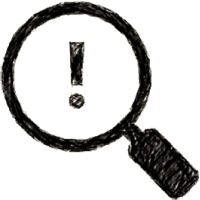Section 1: Discussion Questions
- What is the harm of her friends seeing this research information?
- How could this type of situation be avoided?
- How does this type of situation affect the integrity of the study? How does this type of situation affect the participants?
- Why is it important to securely store research information?
1.1 Documentation
The ethical conduct of research is also measured by the degree to which the information collected is accurate and precise. Information should be recorded and documented carefully according to the research design so that the potential for error is reduced. Documentation is the act of recording, summarizing and/or coding information for future use.
 Documentation must be accurate so that the records of research activity represent what actually occurred during testing/participation. Accurate documentation also allows others to more easily detect any errors that may be included in the information collected. If information is recorded inaccurately, the results of the study may not be useful.
Documentation must be accurate so that the records of research activity represent what actually occurred during testing/participation. Accurate documentation also allows others to more easily detect any errors that may be included in the information collected. If information is recorded inaccurately, the results of the study may not be useful.
Documentation should be completed as the research occurs, not at a later time. Information is likely to be more accurate when recorded as soon as possible rather than recalling information from memory, which can be mistaken.
Definition: Documentation is “the collation, synopsizing, and coding of printed material for future reference” (American Heritage Dictionary of the English Languages).
 Case Example for Documentation
Case Example for Documentation
In a weight loss study, the research assistant failed to measure the participant's weight at the beginning of the study. Later, when it was time to review the results of the study, the assistant realized that he did not have the weight for the participant.
Section 1.1: Discussion Questions
- How does this type of situation affect the integrity of the study?
- What should you do if you forget to document important information in the beginning of the study?
- Why is it important to accurately document research information?






